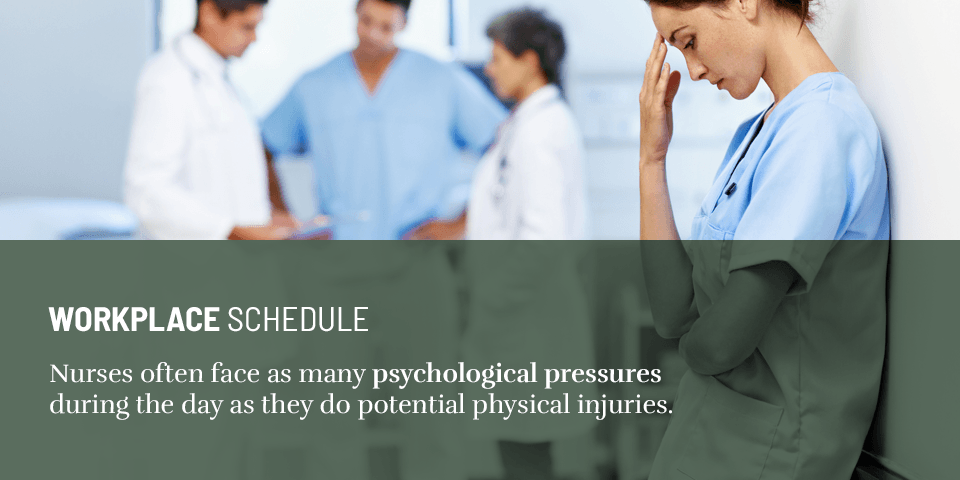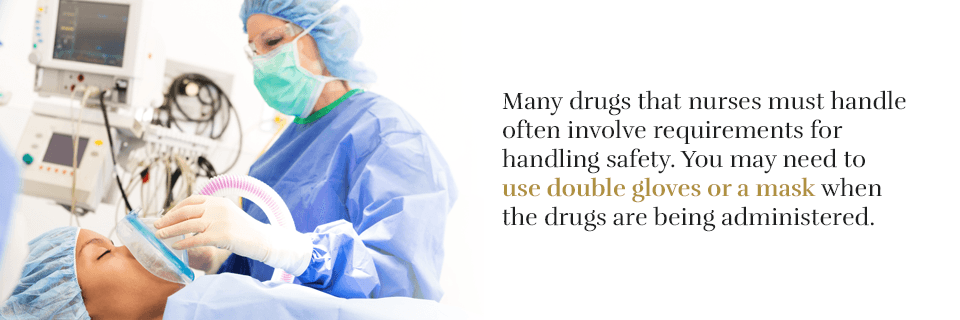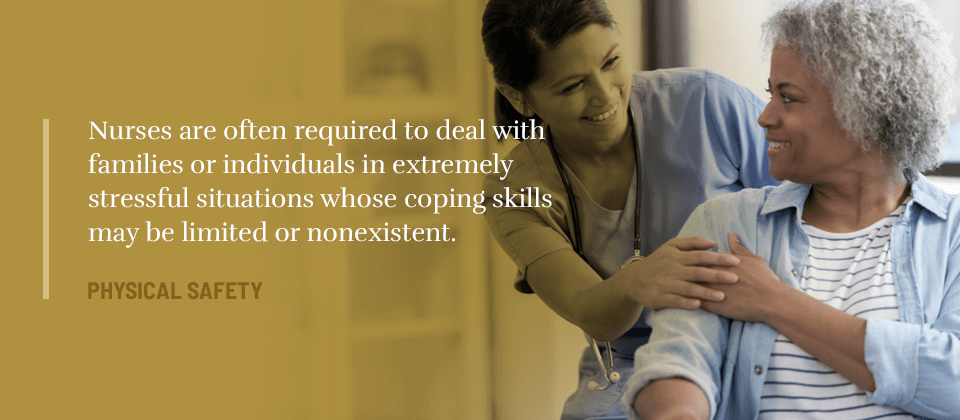Table of Contents
Nursing is one of the most critical professions in America. There are also times, however, when it can be one of the most dangerous. Nurses often work long hours, including extra shifts in potentially violent situations where they are working in locations that are short-staffed.
The U.S. Census Bureau of Labor Statistics reported that nursing has the top rate of nonfatal occupational injuries. One in four nurses reports that they have been physically assaulted while on the job. In fact, nurses are more likely to experience workplace violence than police officers or prison guards are. More than 80 percent of nurses who took part in the American Nursing Association’s (ANA) Health Risk Appraisal reported that they had a significant risk for stress in the workplace.
Nurses face many possible risks for workplace injury every day.
Common Workplace Injuries for Nurses
There are many physical and mental health risks of being a nurse. Here are the most common challenges:
1. Patient Handling
Hardly a day goes by when a nurse doesn’t have to move a patient on or off a stretcher or in or out of a wheelchair or a bed. When most of these patients are admitted, they are already very ill, older and suffering from dementia or have suffered an injury that prevents them from being able to help themselves. When you combine these factors with the stark reality that far too many Americans, particularly older Americans, are obese and that nurses often have to work in situations where they are understaffed and may have to move the patient on their own, it’s easy to see how a nurse could injure themselves when handling a patient.
Musculoskeletal injuries to the head, back or neck caused by lifting patients comprise the majority of injuries that nurses report when they are on the job.
2. Danger From Needles
When most of us require an injection either during a visit to our doctor or while in the hospital, nurses usually give those injections. In most cases, nurses do this job flawlessly. And yet accidentally being stuck with a needle is a genuine concern for nurses. Many patients are afraid of needles, and they may jerk away suddenly or move when a nurse is trying to give them an injection. Often nurses need to give injections in high-stress situations. Nurses can also make mistakes, particularly if they are working when fatigued at the end of a shift, if staffing is low and they have been busy nonstop or if they’re working a double shift.
Federal law has required since 2001 that hospitals, doctors’ offices and other medical clinics use safe needles. Even with this law, about 384,000 needle sticks still happen in hospitals and doctors’ offices every year.
3. Workplace Schedule
Nurses often face as many psychological pressures during the day as they do potential physical injuries. Nurses often work long hours or double shifts. They come in early, stay late and work through breaks. Many healthcare organizations have strict schedules when it comes to how much care a patient should receive in an effort to discharge patients earlier so that these for-profit healthcare centers can have higher patient loads. This often means that nurses must work at a frantic pace. Nurses are frequently asked to use complicated technology, sometimes with little training. As the population ages, nurses must deal with an increasing volume of elderly patients who are often very ill. There is also the issue that there are never enough nurses available to hire and that the nursing workforce itself is growing older.
All these factors can create burnout and stress, which have significant consequences for patient care. As nurses are asked to do more and more, the stress level continues to rise. A study in the late 1990s showed that stress on the job is the leading cause of absences among nurses.
Workplace Safety for Nurses
While nurses face numerous physical and psychological challenges, there are some occupational safety tips they can observe to help reduce these risks.
1. Needles
As the statistics above showed, needle sticks are an ever-present danger for nurses. Some things you can do to reduce accidental sticks include:
- Use the safety features of the needle.
- When inserting the needle, keep your fingers behind the point.
- Ensure adequate lighting is available.
- Tell the patient they need to avoid making any sudden movement.
- Maintain eye contact with the needle while in use.
- Deposit the needle directly into a sharps container.
- Do not use your hand to recap the needle.
- If the needle needs to be recapped, use the scoop technique.
- Ensure you have accounted for all needles and sharps you have used.
2. Patient Handling
Patients come in all varieties and that includes size and shape. If your hospital, clinic or doctor’s office has lifts and transfer devices designed for this type of movement, use them. These devices can include everything from a wheelchair or a gurney to lift swings and pivot discs. If your place of work does not have these tools, you should advocate for their purchase and use. While it can take a little longer to get a patient into a bed, the extra few minutes are worth it for the health of your back and legs.
If these tools are not available, there are some things that you can do to help protect your back. When you’re lifting a patient, push — don’t pull — them. It’s important to get as close to the bed or gurney as you can to prevent strain. Also, don’t extend your arms far from your core. If you’re lifting something from the ground, always use your knees. Get into a squat position, pull the weight as close to you as you can and push off with your legs.
3. Drugs
Many drugs that nurses must handle often involve requirements for handling safety. You may need to use double gloves or a mask when the drugs are being administered. Nurses need to double check these requirements because unintentional exposure could seriously affect their health. Another place where nurses need to be careful about hazardous drugs is a patient’s urine. If this class of drug is being used to help a patient, and they are bedridden and unable to use the toilet, use special precautions when removing urine. If nurses are unfamiliar with these drugs, they should contact the hospital pharmacy or the pharmacy used by their medical practice to learn more about the potential dangers of these drugs.
Medication safety is vital for nurses and patients, so it’s critical to remember the five rights:
- Is it the right medication?
- Is it the right dose?
- Is it the right time to give the medication?
- Is it the right way to administer the medication? This is especially true when handling hazardous drugs.
- Is it the right patient?
4. Repetitive Injuries
Musculoskeletal injuries to the head, neck and back are among the most common kinds of injuries nurses suffer. In the 2016 ANA study mentioned above, 51 percent of nurses said they had experienced musculoskeletal pain at work. This is particularly true if they are required to perform repetitive tasks. Handling patients can put a strain on the entire musculoskeletal system. One way to combat the fatigue that often forces nurses to abuse their back or legs is for nurses to invest in several pairs of good shoes. Rotate the shoes you wear to allow the insoles a chance to return to normal strength. Another way to avoid fatigue is to wear compression socks or stockings.
As we mentioned above, don’t forget to push rather than pull when moving patients on or off gurneys or out of hospital beds, and make sure you squat and use your legs when lifting heavy objects. If you do notice that you’re feeling regular pain in any part of your body when you finish a shift, it’s important to see a doctor right away. If you have suffered a repetitive stress injury (RSI), early detection is essential to prevent the condition from becoming worse. Serious RSIs may make you eligible to receive workers’ compensation.
5. Physical Safety
Physical violence is one of the primary risks of being a nurse. The number of physical attacks on nurses across America increased over 110 percent in the last decade according to reports. Nurses are often required to deal with families or individuals in extremely stressful situations whose coping skills may be limited or nonexistent. Nurses are particularly vulnerable when staffing is reduced and when there is lots of activity, especially during mealtime and visiting hours. It’s impossible to know what will trigger someone and cause them to physically attack a nurse. Nurses who work in clinics in unsafe areas or in short-staffed emergency rooms have increased risk of physical harm.
If you want to reduce the chances of a physical attack taking place, you should:
- Be aware of your surroundings and show situational awareness. If you know you’re going to need to deliver bad news to a family or individual, or you’re working with a patient who has a history of lashing out at nurses, it is always a good idea to have a coworker accompany you when speaking with these people.
- Know about your patients. Be especially aware of patients with a history of violent behavior, drug or alcohol addiction or dementia.
- Always have a clear path to the doorway. Never let anyone — a patient, a family member or a visitor — come between you and the door. Always make sure that you have an exit. If the situation is making you feel uncomfortable and you’re worried about the potential for violence, back out of the room. Never turn your back.
- Keep items in your pockets instead of around your neck. If possible, clip your ID instead of using a lanyard and keep your stethoscope in your pocket. This will reduce the chance of them being grabbed or getting in the way during patient care.
6. Preventing Burnout
Everyone feels burned out now and then because of their jobs. For nurses, however, the high-stress situations that they frequently find themselves in make burnout a real concern. If a nurse gets burned out, it can have serious consequences for their patients and for themselves. It’s critical for nurses to pay attention to the signs of burnout and take some time for themselves.
Self-care can be whatever the nurse enjoys the most. Perhaps they enjoy running, getting a massage, binge-watching their favorite TV show or going out with friends for an evening. Self-care is one of the keys to helping nurses regain perspective about their jobs and about themselves.
7. Be Wary of Social Media
Ten years ago, it would not have been necessary to mention social media. But it’s the reality of life in the 21st century. If you make mistakes online, it could cost you your job and your nursing license. Make sure you understand your employer’s guidelines for how they expect you to conduct yourself on social media.
- Avoid posting anything about patients, even if you’re joking with fellow nurses on Facebook. Nurses have been fired for posting derogatory comments about patients, other nurses, doctors and health care administrators.
- Never post pictures from the workplace, especially of patients.
- It’s probably a good idea not to post your work location or your work hours.
What to Do If You Were Injured at Work
If you believe that you have suffered a repetitive stress injury, you may be eligible to receive workers’ compensation in Pennsylvania. Many people, and probably some nurses, believe you are only eligible for workers’ comp if you suffer a serious injury on the job. It is true that if you suffer a serious work-related injury such as falling and breaking an arm or a leg or having some heavy piece of equipment fall on you, you are eligible for workers’ compensation.
You are also eligible for workers’ comp, however, if you have an injury that is a result of repetitive stress — of doing the same job again and again. A repetitive stress injury can affect your life and your job in significant ways. It can prevent you from undertaking the tasks normally associated with your job, and it may seriously affect your ability to enjoy your life outside of the workplace.
In some situations, as when a nurse is physically attacked, nurses may file for workers’ compensation as well as a personal injury lawsuit. While an employee cannot sue their employer under workers’ compensation law in Pennsylvania, that law does not prevent them from suing another individual who has physically attacked them or hurt them or whose negligence has caused harm. Note that workers’ compensation does not include pain-and-suffering, but a personal injury lawsuit can award damages for these reasons.
If you are a nurse and you have been injured on the job, you should contact an experienced attorney as soon as possible. Attorneys who work on workers’ compensation claims can ensure that you file all the necessary paperwork on time and that you receive the compensation for which you are eligible. If your employer denies your workers’ compensation claim, an attorney can help you prepare an appeal.
If You Have Been Injured at Work, Speak to the Experienced Attorneys at Frommer D’Amico
If you have been injured on the job, whether as the result of an accident or repetitive stress injury, you should contact our team of experienced attorneys at Frommer D’Amico. We can help you through every step of the workers’ compensation process. We have helped win millions of dollars in compensation for our clients.
If you would like to speak to a member of our team, you can call us at 717-428-7465 or visit our contact us page where you can leave your contact information and some details about your situation. Member of our team will get back to you as soon as possible.






